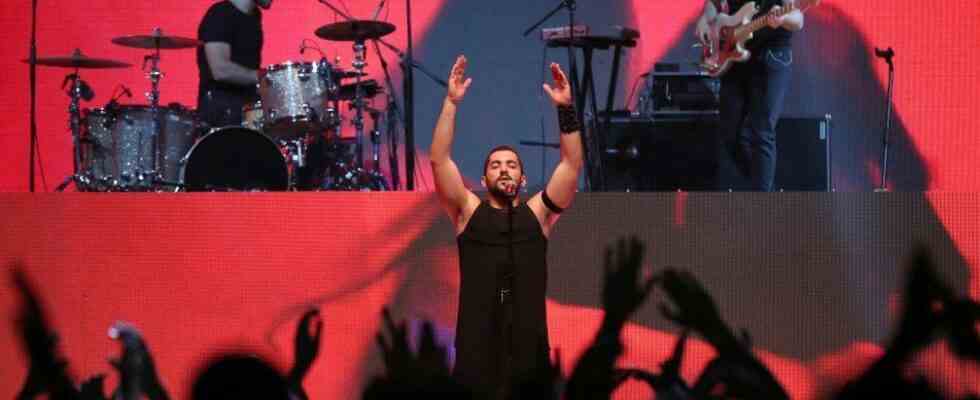It’s an announcement that signals the end of an era: for more than ten years, the alternative rock band Mashrou’ Leila has roamed the stages of the Middle East, from Rabat to Beirut via Cairo. After several years without concerts, due in particular to the Covid-19 pandemic, the group had become rarer in the media. But in a podcast broadcast on YouTube on September 11, its leader and singer Hamed Sinno announced that the members of the group “did not plan to work together again”. Which sounds, for now, the end of Mashrou ‘Leila.
The group, formed in 2008 within the American University of Beirut in Lebanon, quickly became major on the alternative scene of the Arab world, due to their melodic pop rock and their lyrics exploring feminist and LGBTQ + themes, the social or political struggles. Its singer, Hamed Sinno, openly gay, quickly became a standard bearer for the LGBTQ + community of the Middle East and its diaspora. Five albums later and dozens of concerts around the world, Mashrou’ Leila bows out.
A tumultuous history with political and religious authorities
A success that quickly spread beyond the borders of Lebanon, with the group gaining an increasingly large audience throughout the Arab world. But their passages attract the wrath of religious conservatives, especially Catholics, accusing them of “blasphemy” and “attacks on morals”. The group is victims of homophobic attacks online and at every concert. In Jordan, their performances were canceled in 2016 and 2017, following protests from parliamentarians, followed by a stage ban. In 2017, the group was banned in Egypt, after a concert bringing together 35,000 people in Cairo: in the public, spectators had waved rainbow flags, and the images were posted on social networks. Following this concert, the Egyptian authorities launched a major campaign of repression against the LGBTQ+ community, making arrests for “public indecency” and “inciting young people to immorality”. Mashrou’ Leila had denounced the “homophobic frenzy in the media” and found it “disgusting to think that all this hysteria is due to the fact that some kids have held up a fabric representing love”.
Among the spectators of this concert in Cairo, Sarah Hegazi, who waved a rainbow flag. A week later, she will be arrested by the Egyptian security services, accused of belonging to an organization “against the law” and “incitement to debauchery in a public place”. She was held in pre-trial detention, then arrested, convicted and imprisoned. During her stay in prison, she will be tortured. In 2018, she went into exile in Canada. In June 2020, she will kill herself in this country where she felt alone, traumatized by her experience in prison. For Mashrou’ Leila, this event will be an additional wound, and a sign that fighting for LGBTQ + rights in the Middle East comes at a high price, that of harassment and death threats.
For Hamad Sinno, it’s time to reinvent himself
In 2019, the bans are happening again, but this time in their own country, Lebanon. While a concert is planned at the Byblos festival in early August, the group is accused of “blasphemy” during the summer, after sharing a photo parodying the image of the Virgin Mary on Facebook. Under pressure from the Catholic authorities, their concert was cancelled. Many fans will come to protest against the ban, demanding more individual freedoms and denouncing the weight of religious organizations.
After months of media absence, Mashrou’ Leila seemed to have disappeared. Until September 11, when its singer and leader Hamad Sinno was a guest of the Lebanese podcast Sarde. This 1h30 interview reveals more about the mental state of the singer and his projects, his addiction problems and the threats he may have received in recent years. Years of homophobic harassment, political struggles, death threats and exile have exhausted him. If Hamad Sinno has announced that the group does not plan to work together again for the moment, each of the members is pursuing their projects in parallel. On social media, many fans mourned the band’s split, and shared their favorite band songs. While recalling that there was a before and after Mashrou Leila for the youth of the Middle East.

